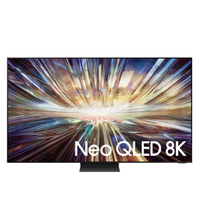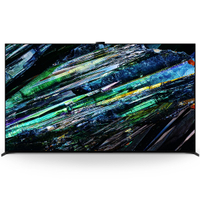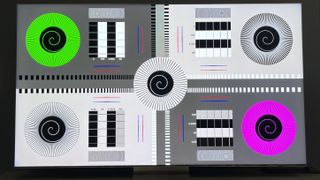While the OLED77Z3 looks spectacular with hard-to-find 8K content, stellar upscaling processing and the joy of seeing such a big screen so densely populated with self-emissive pixels still make it a huge temptation even in today’s 4K world.
Pros
- +
Sensationally detailed, clean pictures
- +
Remarkable contrast and light control
- +
Excellent 8K upscaling
Cons
- –
Much more expensive than 4K equivalent
- –
Native 8K content remains elusive
- –
Slightly underwhelming sound
Why you can trust TechRadar We spend hours testing every product or service we review, so you can be sure you’re buying the best. Find out more about how we test.
LG Z3 OLED TV: Two-minute review
The first thing to know about the LG Z3 OLED TV is its price: £7,999/$9,999 for a 77-inch screen size. While such a cost puts LG’s 8K OLED TV beyond the reach of most households, it doesn’t stop the Z3 from being not just one of the best OLED TVs, but stellar enough with its performance to make real inroads into the tough job of justifying such a 4K TV-busting price.
For starters, looking at the LG Z3 OLED TV, it’s hard to overstate the jaw-dropping precision, detail and clarity you get when over 33 million self-emissive pixels produce their own light and color completely independently of their neighbours. Many people who have spent time with the best 8K TVs compare it to looking through a window rather than watching TV, but that experience is particularly acute when the pixels are combined with the pixel-level light control that only OLED technology can currently deliver (without spending six figures on a monster micro-LED display).
Unlike its 88-inch sibling, the 77-inch Z3 uses LG’s brightness-boosting Micro Lens Array technology, which adds more intensity to OLED’s light control advantage and, in conjunction with a much-improved new picture processor, opens up a wider but still beautifully natural and nuanced colour range. LG’s 8K monster delivers extraordinary big-screen gaming performance, too.
Its audio isn’t as potent as its pictures, and nothing – except a massive discount – gets around that hefty price. But the AV world would undoubtedly be a sadder, duller place without LG’s no-compromise, envelope-pushing 8K beast.
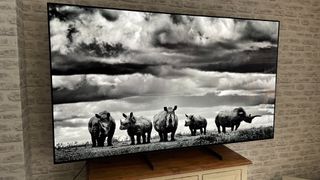
LG Z3 OLED TV review: Price and release date
- Release date: March 10, 2024
- 77-inch: £7,999 / $9,999 (around AU$15,000)
- 88-inch: £24,999 / $24,999 (around AU$37,600)
When the 77-inch version of the Z3, the LG OLED77Z3, first launched, LG told us it wasn’t scheduled to go on sale in the US, while a search of UK and Australian retailers found it selling for a life savings-draining £14,999 in the UK and $15,999 in Australia. As we were in the process of writing and publishing this review, though, things changed pretty radically. First, the 77-inch Z3 suddenly appeared for sale in the US – priced at a relatively reasonable $9,999. Then it started showing up on many UK retailer sites costing just £7,999 – an overnight cut of almost 50% – while disappearing from Australian retailers.
All of this is a bit confusing, but the happy upshot is that for UK and US buyers the 77-inch Z3 is now a lot more approachable than it used to be. That’s not to say, of course, that it’s suddenly a mass market proposition. It still costs £3,500/$5,500 more than the 77-inch version of LG’s current flagship LG G4 4K OLED TV. It’s also the case that Samsung’s flagship 75-inch 8K TV, the Samsung QN900D, costs £1,500 less than the OLED77Z3. So it remains the case that going 8K costs more than sticking with 4K – especially in the OLED world. As I’ll discuss in the Value section later, though, the Z3 is just about unique enough to make its price at least feel appropriate.
LG Z3 OLED TV review: Specs
Swipe to scroll horizontally
| Screen type: | OLED |
| Refresh rate: | 120Hz |
| HDR support: | Dolby Vision, HDR10, HLG |
| Audio support: | Dolby Atmos, DTS |
| Smart TV: | webOS 23 |
| HDMI ports: | 4x HDMI 2.1 |
| Built-in tuner: | ATSC 3.0 (US) |
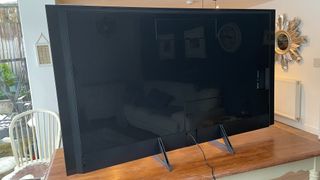
LG Z3 OLED TV review: Features
- 8K OLED screen
- MLA brightness-boosting technology
- Comprehensive gaming support
As you’d hope for a 77-inch TV that costs £7,999 / $9,999, the OLED77Z3 is packed with cutting-edge features. Starting, of course, with that all-important 8K (7680×4320) resolution.
Some may question its importance, I guess, given that genuine 8K content remains extremely hard to find. However, one or two 8K green shoots are forming out there –including the ability to film your own 8K content on some of the latest smartphones, and hints of potential 8K gaming developments.
Some also argue that 8K doesn’t actually deliver a perceptible picture quality difference over the 4K resolution of the best TVs.
However, fitting so many pixels into a 77-inch screen delivers a much smaller pixel pitch than you get with a 4K resolution – and I’ve witnessed before how much this can improve your viewing experience, albeit more in areas such as depth of field, object three-dimensionality and noiseless immediacy than mere sharpness and detail.
Even better for the LG Z3’s usefulness in today’s limited 8K content world, 4K sources can look amazing on it too thanks to the power of the TV’s AI-infused Alpha 9 Gen 6 picture processor. Anyone who thinks upscaling is still the ugly mess it was when the first HDTVs rocked up a couple of decades ago is in for a shock if they get a chance to see how effectively the Z3 can add millions of extra pixels to 4K sources in real time.
Not all 8K TVs boast processing as potent as the LG Z3’s, of course. But in this case, the idea that 8K TVs have no current purpose just doesn’t hold up. I’ll come back to this more in the picture performance section.
The 8K resolution gets extra weight in the Z3’s case, too, because it’s delivered by an OLED TV, where every single pixel creates its own light, contributing that bit more potential precision to the 8K experience. The difficulties associated with fitting so many self-illuminating pixels into a 77-inch screen likely impact production yield rates – hence the high price. But the fact that the screen’s lighting is as refined as its pixel count is a key attraction for well-heeled videophiles to ponder.
Happily, the challenges associated with fitting so many OLED pixels into the Z3’s screen hasn’t stopped LG from also fitting this flagship TV with its new Micro Lens Array technology (though not its 88-inch sibling, which has a standard OLED panel). Part of LG’s so-called ‘Brightness Booster Max’ functionality, MLA tech places thousands of tiny mirrors behind the screen to focus the light forward more directly, improving the TV’s brightness without putting more strain on OLED’s organic components.
My measurements revealed a peak brightness from the 77-inch Z3 on a 10% HDR window of almost 1,000 nits and just over 1,000 nits on a 2% HDR window. These numbers are up on LG’s previous Z2 8K OLED range, as I’d expect with MLA in play. They’re only up by between 10 and 15%, though, whereas using MLA technology has increased the peak brightness of the LG G3 and G4 4K TVs to more than 1,400 nits – more like a 25-30% increase over their non-MLA predecessors.
I can’t say for sure why MLA hasn’t had such a dazzling effect on the 77-inch Z3 I tested, but I suspect it has something to do with the EU’s latest round of TV energy consumption regulations.
As ever with a premium LG TV, the Z3’s HDR support encompasses the HDR10, HLG and Dolby Vision formats, but not the HDR10+ format developed as a rival for Dolby Vision. Its connections are headed up by four full 48Gbps bandwidth HDMI ports capable of handling 8K signals at 60Hz and 4K signals at 120Hz.
- Features Score: 5/5
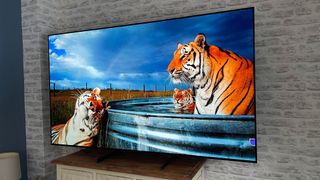
LG Z3 OLED TV review: Picture quality
- Stunning detail and sharpness
- Awesome contrast
- Almost unbelievably good upscaling
To make it absolutely clear just how much the Z3 should be considered a TV of today rather than some potentially distant 8K tomorrow, let’s first focus on its remarkably good 8K upscaling.
The addition of AI to the picture processing world has transformed how well high-resolution TVs can upgrade lower-resolution sources in real time, and this transformation is no more obvious than in the way the LG Z3 converts 4K to its screen’s native 8K pixel count.
The results are pretty much flawless, in fact, resulting in pictures that look sharper, denser and more immediate than they do in their 4K original form. Even more amazingly, the Alpha 9 AI 8K Gen6 processor manages to add the literally millions of pixels required to turn 4K into 8K without exaggerating any noise or grain a source image may contain. It’s arguably this ability to distinguish between noise and ‘real’ picture information when deciding which pixels to add to the image that LG’s latest processor that most goes beyond anything we’ve seen before from the legendary OLED brand.
There’s no obvious lag, over-enthusiastic object edge enhancement or general softness to the 8K upscale, either. On the contrary, it achieves just the sort of three-dimensional, depth-enhanced look associated with a true 8K experience. So to reiterate this point for anyone nodding off at the back, the LG Z3 can make a difference to your AV life right now.
This is not to say that the Z3’s pictures aren’t even better with native 8K, of course. My trusty 8K demo reel of splendid creatures and amazing landscapes by the video gurus at Spears & Munsil looks nothing short of mesmerisingly real. It’s as if the TV has disappeared and a hole has opened up in your wall through which you can literally look directly out on the majesty of nature in all its ‘unpixellated’ glory.
This feels especially true in the Z3’s case because of OLED’s self-emissive nature. Having pixel-level light control working with so many pixels at such a fine pitch delivers a peerless degree of local contrast that feeds into an unprecedented sense of precision and sharpness. that I haven’t seen before. And this peerless local light control feeds into a supremely balanced, ultra-refined and seemingly more expansive colour palette courtesy of LG’s latest panel and processor.
So while the LG Z3’s 4K upscaler makes it relevant as a truly premium performer today, its native 8K performance confirms its arguably peerless readiness for the potential video format of tomorrow.
On top of its resolution joys, the Z3 delivers the other picture strengths OLED is renowned for, such as the ability to combine inkily deep and neutral black tones with peak white picture details even just a pixel apart without any compromise. This results in neither any light ‘blooming’ around stand-out bright objects nor any obvious reduction in the brightness of those same stand-out bright objects to avoid blooming.
The resulting intensity with HDR images makes the 77-inch LG Z3 appear brighter than its measured luminance values would lead you to expect.
You can also watch the Z3 from almost any angle without any loss of contrast or colour saturation unlike most LCD TVs. And LG’s latest 8K motion processor does an excellent job in its ‘Cinematic Movement’ mode of gently massaging away the harsh, resolution-reducing look that judder can otherwise cause during 24 frames a second film presentations.
There are only a couple of negative points I can muster about the LG Z3’s picture. First, while it copes extremely well with good quality HD sources, heavily compressed HD and really all standard definition sources can end up looking a bit soft and artificial despite the stellar efforts of the new processor. Second, while its use of light is insanely precise, it isn’t as outright bright as either premium LCD TVs or some premium 4K OLEDs – especially when it comes to HDR images that flood the whole screen with brightness.
This latter issue is a surprise given that the 77-inch Z3 uses MLA technology – though to reiterate this point, the extra light precision and local contrast control the 8K array of self-emissive pixels delivers does make the screen appear brighter than it actually is.
- Picture quality score: 5/5
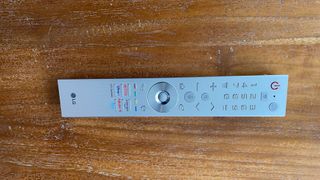
LG Z3 OLED TV review: Sound quality
- Virtual 9.1.2-channel upmixer
- 60W 4.2-channel speaker system
- Wireless Dolby Atmos and WOW Orchestra support
Tucked away behind the 77-inch LG Z3’s epic screen is a 4.2-channel speaker set up powered by a promising 60W of claimed power. LG’s latest Alpha 9 Gen 6 processor is able to up-mix any source to a virtual 9.1.2 presentation, and to top things off the TV supports both lossless transmission of Dolby Atmos sound to compatible LG soundbars and LG’s Wow Orchestra feature, where the speakers in the TV join forces with the soundbar to create a wider soundstage.
All these audio features only add up to a mixed bag of sound performance, though. On the upside, the AI upmixer option does a startlingly good job of taking limited-channel audio tracks, even plain stereo, and remixing their details into a much larger soundstage. Details are cast far and wide and are spaced around so artfully – including being given a sense of verticality – that it’s sometimes hard to believe you’re not listening to a native Dolby Atmos mix.
The remix helps the soundstage appear even bigger than the king-sized screen, making it more immersive – a feeling enhanced by the speakers being sensitive enough to pick out lots of detail without making anything sound harsh or exaggerated. Bass impact is diminished by LG Z3’s upmixer, though, leaving soundtracks feeling a bit thin – so much so that action movie fans might prefer to turn the upmixer off, despite its other strengths.
There also isn’t enough power available to the audio system to deliver the sort of volumes and raw impact with action movie soundtracks that pictures as big and resplendent as those the 77-inch Z3’s screen delivers deserve to be partnered by. Finally, while the sound can spread beyond the TV’s sides, it doesn’t enjoy much forward impact, typically seeming more like it’s happening behind the screen rather than around your seating position.
- Sound quality score: 3.5/5
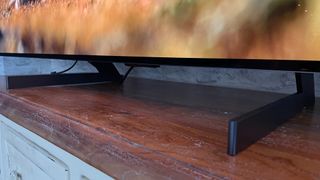
LG Z3 OLED TV review: Design
- Distinctive and attractive ‘strata’ rear design
- Ships with feet this year
- Designed for wall mounting
As with LG’s previous 8K TVs, the Z3 features a so-called Gallery design that’s intended to look particularly good when hung on a wall. So its bezel is slim and enjoys a premium finish, build quality is excellent throughout, and the rear angles in steeply from the screen’s edges so the TV looks unusually thin from all but the most extreme viewing angles.
That doesn’t mean, though, that the LG Z3 doesn’t also cater to people who’d rather place the TV on a stand. It ships with a pair of feet and features a very distinctive high gloss, almost mirrored rear finish together with comprehensive cable management features. In other words, LG is happy for its flagship TV to be admired from any angle.
While it’s nice to now find feet included rather than them being an optional extra, they are a bit spindly and basic for a TV that looks so premium in other ways. Also, while the 77-inch LG Z3 tries to create the illusion of being very slim around the back, in reality, it sticks out quite a long way when it’s hung on your wall.
- Design score: 4/5
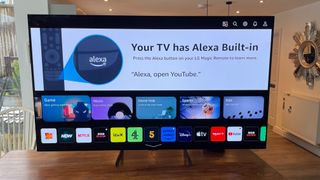
LG Z3 OLED TV review: Smart TV and menus
- webOS 23 smart system
- Voice control support
- Support for multiple user profiles
Smart features on the Z3 are provided by LG’s 2023 WebOS platform. This delivers a rich landscape of apps covering all the most important global streaming services – including in the UK all of the main terrestrial broadcaster catch-up apps, as well as the Freeview Play app that brings all these terrestrial broadcaster services together in an easy to browse ‘umbrella’ interface.
The webOS interface can be upgraded to the latest webOS version, too, and while I still have fond memories of the old webOS system that used to superimpose its content over the picture rather than the interface taking over the whole screen as it does now, LG has continued to refine the home screen’s layout and content options to a point where the new approach is finally starting to win me over.
LG’s extensive and effective voice control support also means you don’t even have to engage with the menus that much if you’d rather not. Plus, there’s now support for multiple user profiles so that different members of your household can establish their own personal OS ‘space’, complete with personal content recommendations and even personal preference picture settings.
- Smart TV & menus score: 4.5/5
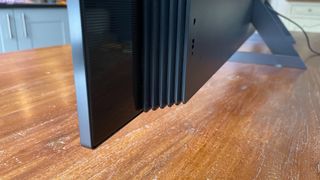
LG Z3 OLED TV review: Gaming
- 4K 120Hz support on all HDMIs
- AMD Freesync and Nvidia G-Sync support
- 13.5ms input lag in Game mode
The LG Z3 is as spectacular a gaming display as I’ve seen. Its sheer size, for starters, lets you become immersed in gaming worlds more than any small monitor ever could.
This is especially true as the Z3’s upscaler arguably works even more effectively with 4K and HD games than it does with video, making the likes of Viking-era England in Assassin’s Creed: Valhalla and modern-day Mexico in Forza Horizon 5 even more irresistibly beautiful places to hang out. Here again, you get an 8K boost without necessarily needing an 8K source.
The TV’s ultra-high resolution, extreme contrast and peerlessly precise lighting really help to enhance the sense of depth and three-dimensionality of first and third-person games too, while colours look gorgeously vivid and clean, but also subtly shaded and refined.
The HDR gaming support extends to a dedicated Dolby Vision game mode, meaning you can enjoy the most dynamic HDR gaming format without having to put up with high input lag. Talking of input lag, in its fastest Game mode the LG Z3 takes just 13.5ms to render images received at its inputs.
The Z3 is capable of taking in 4K 120Hz signals across all four of its HDMI ports, too, meaning dedicated gamers can attach a PlayStation 5, Xbox Series X and gaming PC simultaneously with no compromise to performance. If you manage to find a PC capable of outputting 8K resolution games at 60Hz, the Z3 will support those too.
The comprehensive approach to gaming extends to support for variable refresh rates that takes in official support for both the AMD Freesync Premium and Nvidia G-Sync formats as well as the standard HDMI-based system. There’s support for HDMI 2.1’s Auto Low Latency Mode switching as well, and gamers can call up a dedicated Game Dashboard menu that provides access to a range of gaming features plus information on the incoming gaming signals.
I guess ultra-competitive gamers might prefer a much smaller screen than the LG Z3’s so they can take the whole image in at a glance more swiftly. Anyone who prefers games not totally built on reaction times, though, or who prefers immersion to milliseconds of responsiveness won’t be able to tear their eyes away from the Z3’s gaming glories.
- Gaming score: 5/5
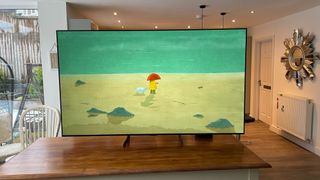
LG Z3 OLED TV review: Value
- Retails for £7,999 / $9,999
- Offers a unique set of features
- Dazzling performance – but you may still need a soundbar
This is the trickiest part of the review for the 77-inch LG Z3. Dropping essentially £8K/$10K on a TV is clearly not something most households will be able to do. Plus, you can buy 75 and 77-inch 4K OLED and 8K LCD TVs for far less. Even Samsung’s flagship 75-inch 8K LCD TV, the excellent QN900D, only costs £6,499.
If you do happen to have the requisite pile of cash lying around, though, it is worth pointing out that the LG Z3, which combines 8K resolution with an OLED display that enables every single one of its pixels to be illuminated by its own light independent of its neighbours, is a unique proposition. One, moreover, that results in unprecedentedly precise and immersive pictures.
- Value score: 3.5/5
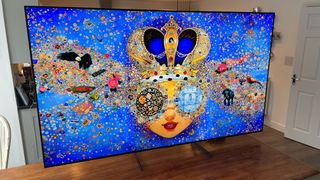
Should I buy the LG Z3 OLED TV?
Swipe to scroll horizontally
| Attributes | Notes | Rating |
|---|---|---|
| Features | Aside from not supporting the HDR10+ HDR format, there’s precious little the Z3 can’t do. Its 8K resolution and OLED combination is currently unique, too | 5/5 |
| Picture quality | Over 33 million pixels each outputting their own light and colour together with OLED’s natural contrast advantage is a vision you’ll never tire of. | 5/5 |
| Sound quality | Clever processing delivers a useful soundstage expansion, and there’s lots of detail to be heard. Bass and power are both limited, though. | 3.5/5 |
| Design | Build quality is outstanding, and the screen looks cool hanging on a wall. It’s quite chunky, though, and the provided feet look a bit cheap. | 4/5 |
| Smart TV and menus | The latest refinements to LG’s webOS system make it easier to find useful content and add welcome support for multiple user profiles. | 4.5/5 |
| Gaming | Seeing your favourite game worlds not only writ as large as 77 inches but also packed with unprecedented detail and refinement never gets old. | 5/5 |
| Value | While its price remains well beyond the reach of most households, a recent huge price cut means that it does now at least feel fairly priced for such a genuinely unique performer. | 3.5/5 |
Buy it if…
You can afford it!
At £7,999/$9,999 the LG OLED77Z3 is clearly not going to be remotely affordable for the vast majority of households. But the rewards if you can snap one up are unique.
You want the ultimate 8K experience
While there are other much cheaper 8K TVs out there, the Z3’s unique ability to have every single one of its 8K pixels putting out its own light and colour independently of its neighbours unlocks the full impact of 8K resolution like nothing else.
